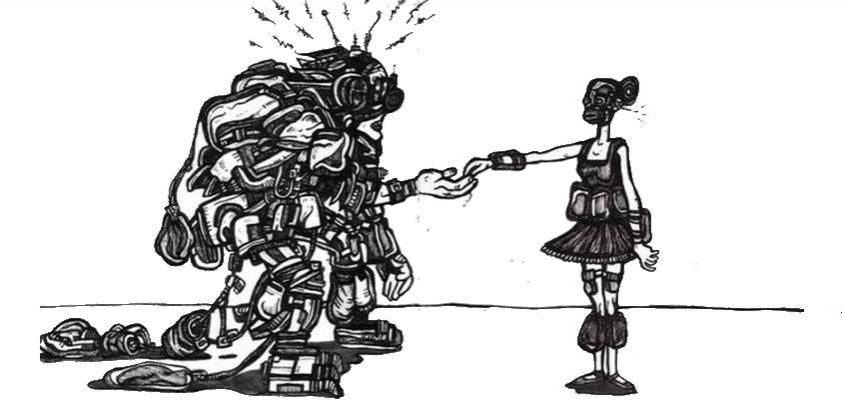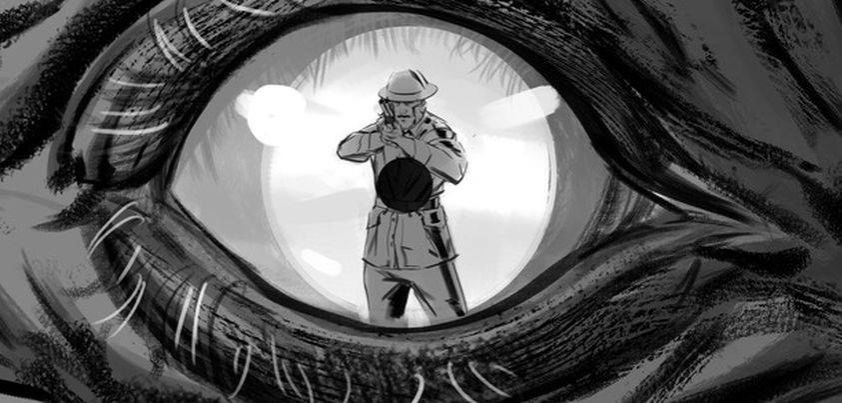 This Louise Erdrich story about the relationship between a former blindfold trapeze artist and her daughter involves three leaps. The first is the tragic failed leap that resulted in the deaths of the woman’s first husband and their unborn child. The second is the successful leap through which the mother saves the then seven-year-old girl from a house fire. The third is a leap of time. The now elderly mother is physically blind and requires her daughter’s help to engage her passion for books and reading. Themes: choice & consequences, mother-child relationships, love, courage, trust, aging, the joy of reading. More…
This Louise Erdrich story about the relationship between a former blindfold trapeze artist and her daughter involves three leaps. The first is the tragic failed leap that resulted in the deaths of the woman’s first husband and their unborn child. The second is the successful leap through which the mother saves the then seven-year-old girl from a house fire. The third is a leap of time. The now elderly mother is physically blind and requires her daughter’s help to engage her passion for books and reading. Themes: choice & consequences, mother-child relationships, love, courage, trust, aging, the joy of reading. More…
All posts by shortsonline
Transactions in a Foreign Currency
 In this story by Deborah Eisenberg, a twenty-eight-year-old woman decides to end her relationship with a lover she has been seeing on and off for almost ten years. The man, who hasn’t contacted her for six months, calls and asks her to drop everything and spend a few weeks over Christmas with him in Montreal. Like many times before, she readily agrees. Some experiences while he is away for a few days help her realize that it is time to let him go. Themes include love, passivity, commitment, selfishness, letting go. More…
In this story by Deborah Eisenberg, a twenty-eight-year-old woman decides to end her relationship with a lover she has been seeing on and off for almost ten years. The man, who hasn’t contacted her for six months, calls and asks her to drop everything and spend a few weeks over Christmas with him in Montreal. Like many times before, she readily agrees. Some experiences while he is away for a few days help her realize that it is time to let him go. Themes include love, passivity, commitment, selfishness, letting go. More…
Harrison Bergeron
 This story by science-fiction writer Kurt Vonnegut is about a future world in which the government tries to make everyone equal. The strong must carry heavy weights, the beautiful must wear masks, and the clever are subjected to distracting sounds to stop them thinking clearly. As is usual in totalitarian worlds, those in power are excused from all this… especially the Handicapper General and her “H-G” men. A powerful, gifted fourteen-year-old boy tries to change things as his parents watch on in confusion. Themes: control (forced conformity through oppression and violence), identity (equality vs. individuality), rebellion, media power. More…
This story by science-fiction writer Kurt Vonnegut is about a future world in which the government tries to make everyone equal. The strong must carry heavy weights, the beautiful must wear masks, and the clever are subjected to distracting sounds to stop them thinking clearly. As is usual in totalitarian worlds, those in power are excused from all this… especially the Handicapper General and her “H-G” men. A powerful, gifted fourteen-year-old boy tries to change things as his parents watch on in confusion. Themes: control (forced conformity through oppression and violence), identity (equality vs. individuality), rebellion, media power. More…
Shooting an Elephant
 This story by Eric Arthur Blair (aka George Orwell) is a narrative essay in which the thesis is the wrongs of British Imperialism. A young officer in the British Colonial Police in the early 1920’s describes an experience with an elephant that had killed a villager. He tells how he felt pressured into shooting the animal, even though he knew this to be unnecessary. His fellow Europeans had mixed opinions but fortunately, none of them guessed the real reason for the shooting. Themes include culture clash, prejudice, the need to maintain authority, and moral conscience vs. pride/”face”. More…
This story by Eric Arthur Blair (aka George Orwell) is a narrative essay in which the thesis is the wrongs of British Imperialism. A young officer in the British Colonial Police in the early 1920’s describes an experience with an elephant that had killed a villager. He tells how he felt pressured into shooting the animal, even though he knew this to be unnecessary. His fellow Europeans had mixed opinions but fortunately, none of them guessed the real reason for the shooting. Themes include culture clash, prejudice, the need to maintain authority, and moral conscience vs. pride/”face”. More…
The Sparrows
 In this story by K. A. Abbas, an Indian man embittered by being forced to follow tradition and enter into a loveless marriage spends thirty years taking revenge on his family and society. He savagely beats his wife and sons, badly mistreats his farm animals, and is abusive to fellow villagers. As the story begins, his wife has left and he is alone in the world. In his misery, he finds solace and redemption through a family of sparrows nesting in the thatched roof of his hut. Themes include tradition, forbidden love, bitterness, revenge, cruelty, alienation and loneliness, connection, redemption. More…
In this story by K. A. Abbas, an Indian man embittered by being forced to follow tradition and enter into a loveless marriage spends thirty years taking revenge on his family and society. He savagely beats his wife and sons, badly mistreats his farm animals, and is abusive to fellow villagers. As the story begins, his wife has left and he is alone in the world. In his misery, he finds solace and redemption through a family of sparrows nesting in the thatched roof of his hut. Themes include tradition, forbidden love, bitterness, revenge, cruelty, alienation and loneliness, connection, redemption. More…